Through the Eyes of the former Consul General Yamada (June, 2017 - July, 2020)

Having Great Expectations in Female Leaders
On February 25, before COVID-19 reportedly spread through the Seattle area, the Japan-America Society of the State of Washington organized a symposium, titled “Empowering Women in Japan and the USA.” Moderated by Ms. Lori Matsukawa, the speakers, Ms. Akiko Doden, a famous journalist at NHK World TV; and Ms. Courtney Gregoire, Chief Digital Safety Officer at Microsoft and former Commissioner of the Port of Seattle, spoke about their personal experience with the glass ceiling. The symposium concluded with a lively discussion with the audience, who shared their questions and opinions on the importance of women having a greater voice in society and the obstacles in achieving it.
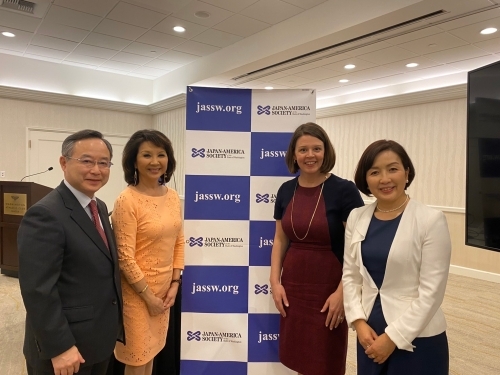 "Empowering Woman in Japan and the USA" symposium: Me, Ms. Lori Matsukawa, Ms. Courtney Gregoire, Ms. Aiko Doden (left to right) |
Through meeting multiple mayors of Washington State, I had the impression that there were a large number of female mayors, so I decided to look into it and shared my findings in my opening speech at the symposium. I found out that the four most populated cities in the state (Seattle, Spokane, Tacoma, Vancouver) have a directly elected female mayor. The fifth most populated city, Bellevue, has a female mayor elected from among city council members. The sixth and seventh most populated cities, Kent and Everett, also have directly elected female mayors. In summary, the seven most populated cities in the state have female mayors! Each of these cities has a sister city relationship with a Japanese city, but all the Japanese mayors are male. Moreover, when comparing the sister cities and the number of women in city council, 6 out of 9 Seattle council members (67%) are women while in its sister city, Kobe, 15 out of 69 council members (22%) are women; in Spokane 5 out of 7 council members (71%) are women while 6 out of 40 council members (15%) are women in its sister city, Nishinomiya. In Tacoma 3 out of 8 council members (38%) are women while in its sister city, Kitakyushu, 11 out of 57 council members (19%) are women; in Vancouver 3 out of 6 council members (50%) are women while 6 out of 20 council members (30%) are women in Joyo, its sister city.
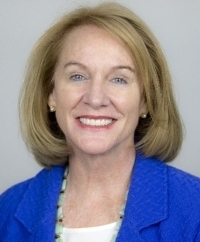 Mayor Jenny Durkan - Seattle (Photo courtesy of City of Seattle) |
 Mayor Nadine Woodward - Spokane (Photo courtesy of City of Spokane) |
 Mayor Victoria Woodards - Tacoma (Photo courtesy of City of Tacoma) |
 Mayor Anne McEnerny-Ogle - Vancouver |
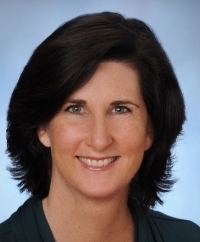 Mayor Lynne Robinson - Bellevue (Photo courtesy of City of Bellevue) |
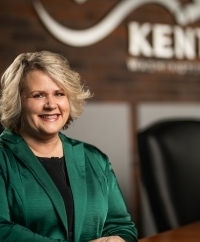 Mayor Dana Ralph - Kent (Photo courtesy of City of Kent) |
 Mayor Cassie Franklin - Everett (Photo courtesy of City of Everett) |
In the case of the sister relationship between Hyogo Prefecture and the State of Washington, they both have male governors. Comparing the number of women in each legislature, however, 55 out of 147 members (37.4%) are women in Washington State while in Hyogo Prefecture, 13 out of 86 members (15%) are women. Taking all the statistics mentioned previously, it shows that the ratio of women in the state legislature and city councils in the State of Washington are far higher than in Japan. The state’s female leaders are actively taking legislative initiatives on a variety of issues, including homelessness and COVID-19.
The success of women in political leadership positions during the COVID-19 pandemic has gained attention. These leaders have stood their ground while clearly explaining to the public the necessity to respect limited mobility during such challenging times to prevent the spread of the virus. The recently most discussed woman in such a leadership position is New Zealand’s Prime Minister Jacinda Ardern. She not only worked with medical professionals to send a clear message to the public and implemented a 20% pay cut for cabinet ministers, but also captivated children by speaking calmly to them through a home-recorded video. New Zealand has successfully brought down COVID-19 cases to zero. Taiwan’s President Tsai Ing-wen is applauded for her efforts as well. Despite its proximity to China, Taiwan, with the aide epidemiologist and Vice President Chen Chien-jen, successfully was able to minimize the number of cases. In addition, Taiwan is helping countries around the world tackle the virus and has donated two million face masks to Japan. Efforts of other country leaders such as Chancellor Angela Merkel of Germany, Prime Minister Erna Solberg of Norway, and Prime Minister Katrín Jakobsdóttir of Iceland have also been globally recognized. Notably in Japan, Tokyo Governor Yuriko Koike has shown her leadership with her daily press conference.

Prime Minister Jacinda Ardern of New Zealand |
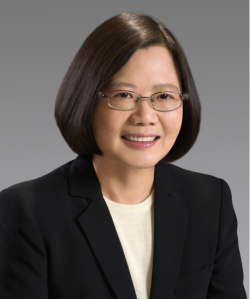 President Tsai Ing-wen of Taiwan (Photo Credit: Office of the President website (https://english.president.gov.tw/Page/40) |
The importance of women’s involvement in decision-making and leading an organization has also been a focus in the world of business. According to an article issued in early March by the Brussels Times, Moody’s reviewed 540 companies in Europe and found that in companies with credit rating A, women occupy 34% of seats on the board of directors. (https://www.brusselstimes.com/all-news/business/98168/europes-best-rated-companies-have-more-women-in-charge/) According to an article issued late November 2019 by Bloomberg, in companies in the U.S. with AAA credit rating, 28% of the seats on the board of directors are occupied by women. Bloomberg writer Katherine Greifeld notes, “A Credit Suisse analysis of 3400 companies worldwide in 2016 determined that companies with more diverse management had higher returns on equity, dividends and market values, compared with less-diverse companies.” (https://www.bloomberg.com/news/articles/2019-09-11/credit-risk-is-higher-at-companies-with-fewer-women-directors)
The rigid culture in Japanese politics and economy has long been a topic of debate. It is necessary to have diversity amongst decision-makers so that flexible action is possible, creating an adaptive response to a world of drastically changing technology and global climate. The first step for Japan to realize diversity, being a country with a small number of immigrants, is to encourage the participation of women in the managing of organizations. I believe that the key to revitalize Japan is to change the current decision-making environment from one where men are the majority and women with similar qualifications are the minority to one of greater representation by women. I look forward to seeing how the COVID-19 pandemic will impact women’s roles in society.
